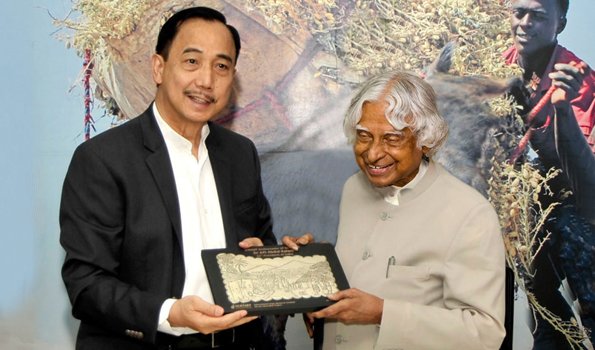Dr Kalam underscores role of biotechnology to feed the world
June 26, 2013 | Wednesday | News | By BioSpectrum Bureau
Dr Kalam underscores role of biotechnology to feed the world
Dr APJ Abdul Kalam receiving the ICRISAT ambassador of goodwill plaque from ICRISAT drector general William Dar
"In science, everything is possible," began Dr Kalam, as he addressed the ICRISAT management, senior scientists, staff members and other invited guests at ICRISAT headquarters on June 20, 2013. "In 1885, distinguished British scientist Lord Kelvin stated that anything heavier than air cannot be flown. A mere 18 years later, in 1903, the Wright brothers conducted their first flight. Challenges are many. It is up to us to find the solutions".
Commenting on the greenhouse containment facility, Dr Kalam continued, "Research breakthroughs in agricultural biotechnology hold the potential for increasing crop productivity and the resistance of food crops to pests and diseases, thereby helping solve the food crisis. The future food demand cannot be met merely from incremental gains through conventional plant breeding. A quantum change in yield improvement is needed."
Dr Kalam proposed a good list of research missions for ICRISAT, starting with, "For PTTC, the first and foremost task should be development of nutritionally enhanced foods and getting them approved." He also listed the analysis of barren lands in India to retrieve at least 50% of it in the next 10 years, and the studying of water bodies towards rejuvenating them by 2020.
Dr Kalam recalled that this year marks the 30th anniversary of the first successful introduction of a foreign gene into a plant. "There is clear evidence that the use of GM crops has resulted in significant benefits like higher crop yields, reduced farm costs, increased farm profit and improvement in health and the environment," he said, "and yet there is a heated debate over GM crops. No illusionary fears can stop the advancement of what is rational and logical. The solution lies in developing beneficial transgenic crops locally. I find today a historical step taken in this direction. The PTTC will be the birthplace of a new generation of transgenic crops."
Mentioning Dr Dar's book, Feeding the Forgotten Poor, where Dr Dar drew a map for "second-generation" GM crops, Dr Kalam said that it is not hard to imagine the immense value of these genetically modified crops. "I have no doubt that the developing world stands to benefit from any technology that can increase food production, lower food prices, and improve food quality," he said.
The PTTC, headed by Dr Kiran Sharma, was established jointly by the Government of India's Department of Biotechnology and ICRISAT in 2009. This US$ 6.2 million project was launched to translate transgenic technology and harness its products to meet the needs of agricultural growth, strengthening national, regional and international linkages in transgenic R&D.
Welcoming the former President of India on the occasion, ICRISAT Director General Dr William D. Dar said, "Modern technologies, particularly agricultural biotechnology, has the potential to reduce crop losses from pests and diseases, improve the nutrient efficiency of food and animal feeds, extend the post-harvest life of fruits and vegetables, and increase the stress tolerance of crop plants allowing them to thrive even under various environmental extremes."
Ever focused on uplifting the poor farmers of the semi-arid tropics, he continued, "Scientific solutions to improve crop productivity, where biotechnology plays an important role, can empower the rural sector by boosting food production, enhancing incomes for the smallholder farmer, and improve his nutritional security."
"The containment facility that Dr Kalam inaugurated was conceived and established after diligent planning in order to ensure absolute control in compliance with global standards," stated Dr Dar.
A highlight of the event was the honoring of Former President Kalam as Ambassador of Goodwill of ICRISAT in recognition of his foresight, his support of science-based solutions, and his championing of the mission of the institute.









